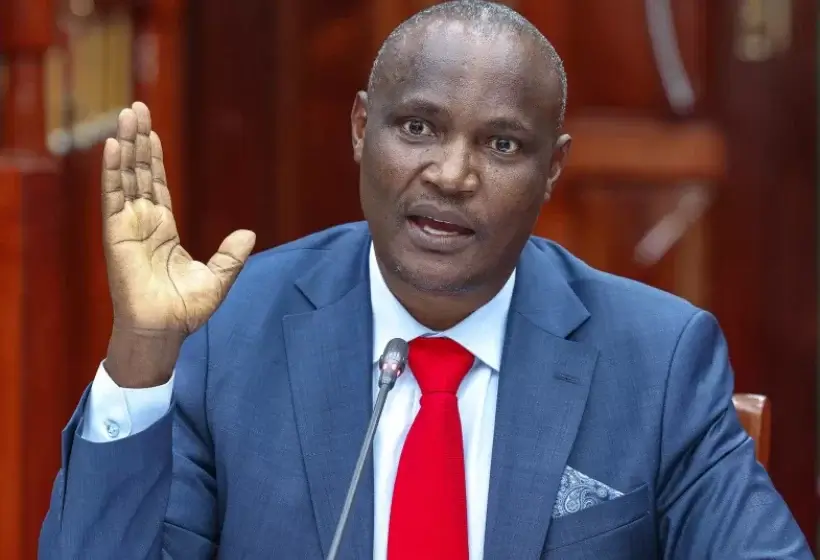|
LISTEN TO THIS THE AFRICANA VOICE ARTICLE NOW
Getting your Trinity Audio player ready...
|
National Treasury Cabinet Secretary John Mbadi on Tuesday continued to face mounting criticism over the controversial potential takeover of Jomo Kenyatta International Airport (JKIA) through a Public-Private Partnership (PPP). The proposed deal with Indian firm Adani Holdings Limited has been met with strong opposition, with many raising concerns about the transparency of the process and the bypassing of competitive bidding.
Appearing before the National Assembly’s Public Debt and Privatization Committee, Mbadi sought to clarify that the deal was still in the negotiation stage, and no final agreement had been signed. He reiterated that public participation was ongoing and that Kenyans would have the final say. “We are at the public participation stage, and if Kenyans reject this deal, it will be terminated,” Mbadi assured the committee.
The PPP proposal, which involves Adani Holdings leasing JKIA for 30 years, comes at a time when the Kenya Airports Authority (KAA) has been struggling financially. Mbadi argued that upgrading the airport through private investment, rather than government borrowing, was the only viable option, given Kenya’s high debt burden. “We are already paying Sh1.1 trillion annually in debt, which is half of what we collect in revenue. There is no room for more borrowing,” he explained.
Despite Mbadi’s assurances, the deal has sparked intense public scrutiny and legal challenges. Critics, including several MPs, have questioned why the project was not subjected to competitive bidding, which would have allowed other companies to present proposals. Instead, the project is being pushed through the Private Initiated Proposal (PIP) method, which allows a private company to approach the government with a proposal without the need for a public tender.
Kitui Woman Representative Irene Kasalu and Baringo North MP Joseph Makilap were among those who voiced their concerns, arguing that the PIP method lacked transparency and was likely to be more costly for the country in the long run. “Why rush into a deal with Adani when we could have explored competitive bidding, which would have given us better options?” Kasalu asked. Makilap added that KAA should have initiated any necessary changes to JKIA, rather than leaving it to an external private company.
However, the controversy deepened further on Tuesday when Mbadi faced the National Assembly’s Public Investment Committee on Commercial Affairs and Energy. He was pressed on potential corruption links surrounding Adani Holdings. Despite the intense scrutiny, Mbadi stated that his department had no records linking Adani to corruption. “We have conducted our due diligence, and there is no evidence of any corrupt practices involving Adani Holdings,” he said.
Later that day, Mbadi appeared before the Senate’s Transport Committee, where the discussion took a more heated turn. Kisii Senator Richard Onyonka introduced new evidence that cast doubt on the claim that Adani Holdings was the only company to show interest in the deal. Onyonka presented letters from three other companies that had expressed interest in working with KAA, but he claimed these proposals were overlooked.
According to Onyonka, KAA had insisted that Adani was the only company to submit a proposal and that no other bids were considered. “These letters show that other companies were willing to partner with KAA, yet their bids were ignored,” the Senator stated. This revelation sparked a tense exchange between Mbadi and Onyonka, with Mbadi maintaining that the Treasury had received no correspondence from any companies other than Adani. “There is no record of these letters being sent to the Treasury,” Mbadi asserted.
The introduction of the letters has added a new dimension to the controversy, raising concerns that KAA may have deliberately sidelined other potential investors in favor of Adani Holdings. Onyonka’s claims have intensified the debate, with many now calling for a thorough investigation into the procurement process.
The proposed deal with Adani has already been slowed by public mistrust, legal challenges, and opposition from labor unions representing KAA staff. Mbadi admitted that the public was not involved in the early stages of the project, which has fueled skepticism and delayed progress. “The project faced headwinds because the public was not consulted from the beginning, but we are addressing this now through public participation,” he said.











LEAVE A COMMENT
You must be logged in to post a comment.